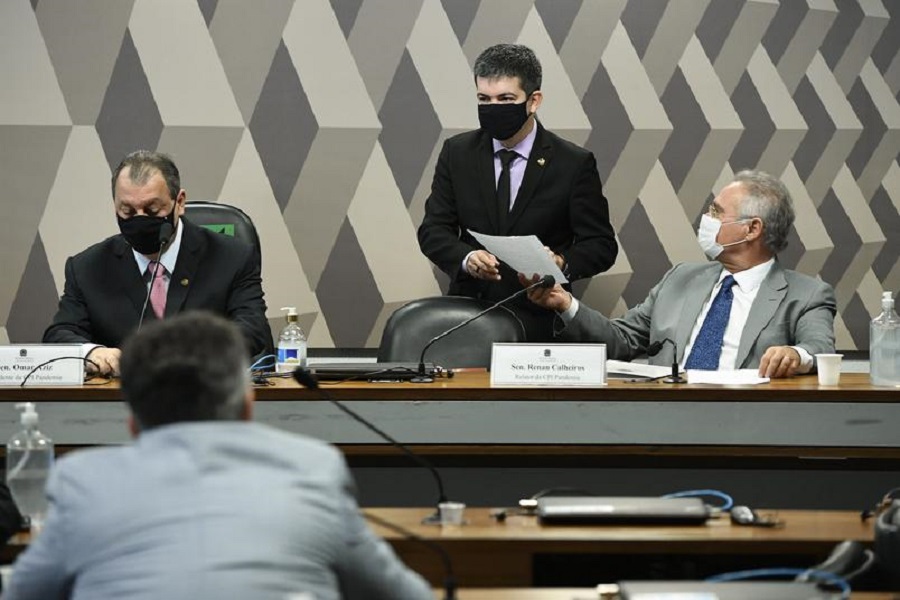RIO DE JANEIRO, BRAZIL – The Brazilian Senate this Tuesday formed a committee to investigate potential omissions by President Jair Bolsonaro’s government in the face of the Covid-19 pandemic; the committee is controlled by the opposition and will be from now on a pebble in the president’s shoe.
The committee, with 11 full members and 7 alternates, has only 4 senators aligned with Bolsonaro and will determine whether the government has any responsibility in the worsening of the health crisis, when Brazil is nearing 400,000 deaths and has doubled in this year’s first four months the total number of deaths in 2020.

The group will be able to summon ministers and other authorities to testify and, in fact, it has already proposed to question the head of the Health Ministry Marcelo Queiroga, and his 3 predecessors, who succeeded each other in office amid the pandemic.
In the first session, the commission’s board of directors was elected: it will be chaired by Omar Aziz, of the Social Democratic Party (PSD), a center party which declares itself to be independent.
Senator Randolfe Rodrigues, of the ecologist Rede party and one of Bolsonaro’s harshest critics in Parliament, was elected vice-president.
The position of rapporteur, key to the course of the investigation, was attributed to Renan Calheiros, of the Brazilian Democratic Movement (MDB), a center-right party that does not conceal its oppositionist nature.
BOLSONARISM’S FIRST DEFEAT IN THE COMMISSION
Bolsonarism tried to prevent Calheiros’ election as rapporteur through judicial channels, using the argument that the senator has already declared his conviction that Bolsonaro has been “omissive”, “denialist” and “incompetent” in the face of the pandemic.
However, the majority prevailed in a committee that will have 90 days to conduct the investigation, although it may be extended, and must conclude with a report that, according to its conclusions, may be referred to the public prosecutor’s office for the initiation of a judicial proceeding.
The Government’s concern lies in the purely political nature of the work, which will also be conducted at a time when the pandemic is far from subsiding and with parties and Bolsonaro starting to focus on the October 2022 elections, in which the president will seek reelection.
Aziz, in his first statement as president of the commission, urged to avoid “political discussions” and that an “anticipated electoral climate contaminates” the investigative work.
“There are surveys showing that 86% of Brazilians know someone who died of Covid. We cannot have political discussions with 400,000 dead,” he emphasized.
LONG LIST OF POTENTIAL OMISSIONS AND IRREGULARITIES
The denialism shown by Bolsonaro since the very beginning of the pandemic has been worrying some sectors of the ruling party for months.
With the start of investigation, the government has made it clear that it shares this concern through an internal document, which was obtained by local media and lists 23 possible cases of omission or irregularities in the fight against the pandemic, about which the commission will now ask for explanations.
The document was drawn up with the goal of preparing a defense in the Senate committee, before which a long list of ministers and former Bolsonaro collaborators is expected to be paraded.
Some of these points of doubt refer to the Health Ministry’s refusal to start the process of purchasing vaccines mid-last year, or Bolsonaro’s reluctance to concede to the severity of a virus that he went so far as to call a “minor flu.”
Delays are also cited in the purchase of oxygen or intubation drugs, which are still scarce in some regions of the country and aggravate the hospital situation.
Other points refer to the spread of false news about the pandemic, the lack of an official awareness campaign about its severity, and Bolsonaro’s pressures for the use of drugs with no proven efficacy against the coronavirus, such as chloroquine, in the public health network.

